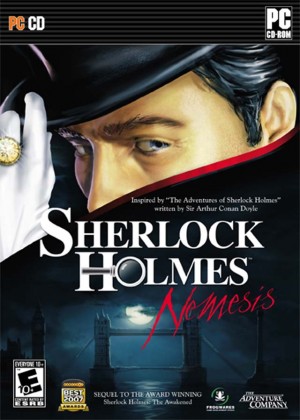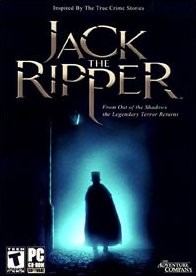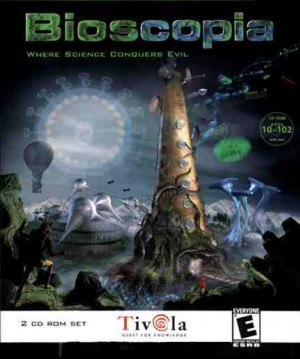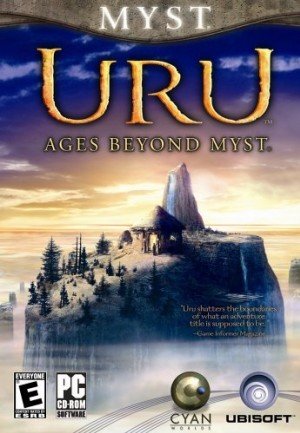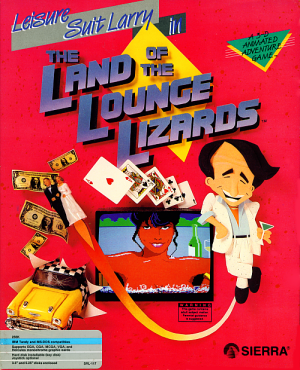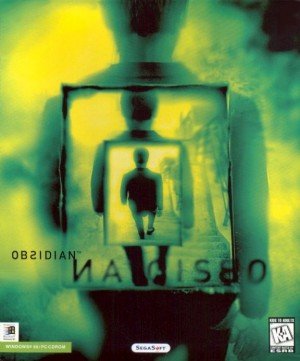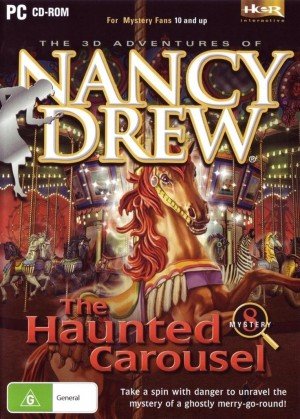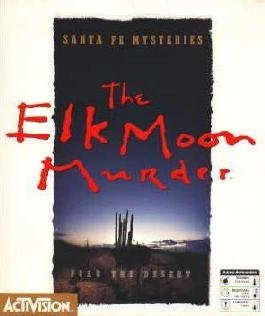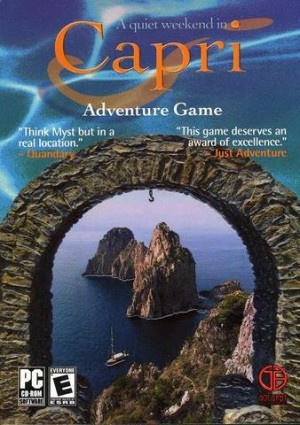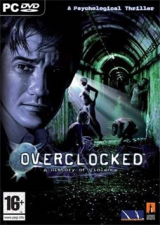Review for Sherlock Holmes: Nemesis

Of all the literary characters that fit the adventure genre, Sherlock Holmes stands deerstalker-and-shoulders above most. Arthur Conan Doyle’s famous detective embodies everything great about mystery adventure games: looking for clues, deducing hidden connections, making ingenious plans, and even slipping on a disguise or two, all in an effort to penetrate a conundrum that eludes the less observant. So it’s no surprise he’s popped up in quite a few games over the years, and the good news is that Sherlock Holmes: Nemesis is easily one of the best.
This time, he’s pitted against another period literary protagonist, cunning gentleman thief Arsène Lupin. (No, I’d never heard of him either, but he’s supposed to be big in France; the creation of writer Maurice Leblanc.) The set-up is delightful: Lupin is in England and plans five audacious thefts, and he directs a personal challenge to Holmes to stop him. It’s all pretty light-hearted stuff, especially after the Lovecraft-inspired horror of the last Sherlock title from Frogwares, and there’s a playful tone all the way through, with plenty of good-natured humour, including a wonderful pull-back-and-reveal gag involving tortoises. Of course, purists might be a little annoyed, as Watson, Holmes’ trusty sidekick, is perhaps more a figure of fun here than he is in the books, but the polite charm the game possesses should win even the most determined curmudgeon over.
The game is an improvement on The Awakened in almost every way. The 3D graphics, though sparse in animation, are clean and surprisingly full of non-player-characters. Whilst there are some re-used locations from last time around, most notably Baker Street and the surrounding area, new lighting effects make the world look crisper and less flat. It’s also far more graphically consistent than the last game, always managing to look good in a sharp, well-detailed (albeit still rather static) way. The character models are nicely detailed, with competent lip-syncing, and the occasional in-game cutscenes aren’t exactly flashy, but they do drive the story along adequately.
The plot, which stays entirely in London, is somewhat weakened by a set of repetitive locales for Holmes, Watson, and the tenacious Inspector Lestrade to visit, but the five-theft structure makes the story a good deal tighter and simpler than the past games, and not to its detriment. To name just a few, players will make trips to the British Museum, the Tower of London, and even Buckingham Palace, coming face-to-face with the monarch herself. Each of these real historic locations is recreated in convincing detail, making the places you peruse as life-like as possible. Following Lupin’s imaginative clues actually gives the story a feeling of personal rivalry, an emotion rarely conveyed well in video games. The only drawback to matching wits with Lupin is the criminal standard of verse with which he supplies Holmes; master thief he may be, but his poetry is of lamentable quality. I’ve never read the Lupin books, but his claims to be a cultured, discerning genius and aesthete are rather undermined by the awful doggerel which often strains to rhyme whilst dispensing the necessary clues.
The gameplay itself is largely concerned with following this trail of clues, and when it works well, you really feel as if you are engaged in a cunning treasure hunt. Let me use an example: early in the game, Holmes visits an art gallery, in which every one of scores of (royalty free) individual masterpieces from across Europe can be examined. They’re used when Lupin sets up an elaborate sequence of messages, Holmes having to hunt from one painting to the next in pursuit of the next riddle. It helps to have a good look through the galleries before the theft is attempted, and it feels -- whisper it -- educational to stroll through the beautifully rendered corridors perusing high resolution masterpieces to a classical score. Similar situations are repeated elsewhere, making the game feel more non-linear than it actually is, while at the same time giving it a relaxed, cultured vibe. Even though the puzzles are hard -- don’t expect to rush through in a few hours -- there is something perfectly therapeutic about strolling around having a bit of a ponder. Now we know what Holmes felt like when he spent nights in reflection with only a heap of shag tobacco and a Stradivarius for company.
Of course, there's more than Lupin’s riddles to solve, although these form the core of the gameplay. There are also some inventory puzzles of varying quality, and some ingenious plot-based puzzles, including one memorable challenge that requires you to use a process of elimination to work out which person a locker belongs to. In true investigative fashion, you’ll also be called upon to perform detective work with a magnifying glass and tape measure in 2D close-up screens, or little tasks such as mending a net. This latter type can be rather abstract and confusing. At one point, for example, when you’re asked to assemble some broken sticks, I can guarantee you won’t have a clue what you’re meant to be aiming for. Most of the riddles are tough in the “right” way, however; they force you to scour each line of poetry for a hidden meaning, perform complex series of calculations, and sometimes follow very precise sequences of actions. Unfortunately, the inventory puzzles are sometimes just a little too complicated to be convincing as the easiest solution to a problem, and the old read-the-designer's-mind puzzles creep back on occasion. There are also situations in which hotspots only appear once the game has decided you’ve done things in an arbitrarily "correct" order.
The series' trademark quiz questions also make a welcome return, with Holmes occasionally asking you to type an answer or select a map location before you progress. They’re great, because they bridge the gap between guesswork and detective work. The questions normally force you to think a bit about the clues in hand and the current state of the plot, and the text parser solves the problem of how to convey abstract knowledge to the computer without a physical game-world substitute. You have the opportunity to freely re-examine all the documents, dialogue, and inventory you have collected, meaning that the answer, no matter how carefully hidden, is always there to be found. Be on the look out for anagrams!
The one aspect of the game that might continue to be a deal breaker for some players is that it's presented in full first-person 3D, using shooter-style keyboard-and-mouse movement, except in the inventory or close-up screens where the game becomes mouse-driven. The implementation is very solid, and not in the slightest bit confusing or complicated, but some folks simply won’t like this approach, and it remains up to you to decide whether it makes the game better or worse. Personally, I love the physicality it brings to the detective work: crouching to follow trails of footprints, discovering a mouse hole in the wall, opening up a secret compartment with a hidden switch; these are the little moments that elevate the game from watching the great detective to feeling as if you are a great detective.
One annoying little detail remains in that Watson retains his ghostly habit of following you without ever actually walking anywhere. Further, there is a physics engine, “Ageia”, which has to be separately installed with the game, yet I can attest it was never used for a physics-based puzzle, or, as far as I can make out, in any context whatsoever. It adds so little to the game I wonder why the developers persist with it.
The voice acting and the script are fairly solid, with Watson and Holmes being particularly well cast and their relationship captured just right, but occasionally an oddly-delivered line will ring hollow, a dodgy accent will appear, or an anachronism will pop up. Small though they may be, these little touches mean the writers and actors haven’t completely succeeded in capturing Conan Doyle’s world, though it’s certainly an admirable attempt. Again, the light tone and mannered elegance do make it easy to overlook any minor transgressions on this front. Although playing as Holmes, the quiz questions and the first-person view have a laudable effect of making you seem distanced from what is meant to be an isolated, at times almost inhuman character. The discrepancy between player and player-character is often a negative factor, but here it serves to preserve Holmes’ image of a man with unfathomable intellect and uncertain motivations. The creators also seem to have gone back to the source and put their own spin on the famous characters. They do not shy away, for example, from a drug reference; cocaine use being important to Holmes’ famed fits of despondency and boredom, an essential part of the original detective.
Essentially, then, everything is in place for one of the best mystery adventures in years. It’s a traditional, puzzle-packed adventure with a modern graphical twist that manages to do justice to one of the most revered literary protagonists of all time. So if you enjoy a tough challenge with plenty of riddles, clues, and a tight, tongue-in-cheek plot, this game will prove a worthy investment for many hours of -- yes, I will say it: fun. Not perfect, not easy, but full of so many nuggets of creativity that it makes the adventure a difficult proposition to resist. Is Sherlock Holmes: Nemesis a mystery worth solving? Elementary.


